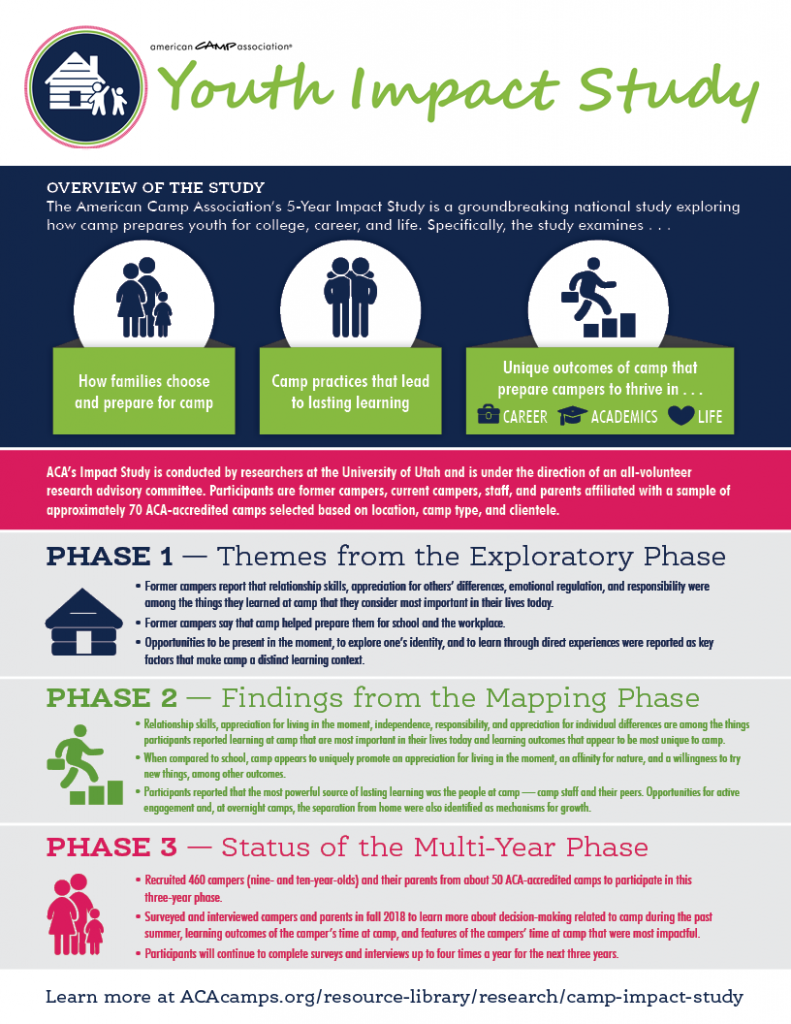Meeting new friends, trying new activities, and spending time away from home. These are all things we remember fondly when looking back at the camp experience. But did you know they these experiences can impact young people’s lives for the better? The American Camp Association (ACA) does, and now they understand why.
In their recently published 5-year Impact Study, the ACA has examined how summer camps prepare youth for college, careers, and adulthood. It specifically looks at how families choose and prepare for camp, which camp practices lead to lasting learning, and unique outcomes of camp that help young people thrive.
“We conducted our first national outcomes study in 2004-2005, and that’s the first time we could point to the specific outcomes of the camp experience that demonstrate why camp is great for kids,” said Dr. Laurie Browne, ACA’s Research Director. “But that study was relatively short term so we couldn’t say anything about it and how those outcomes last over time.”
The current study was conducted by an all-volunteer research advisory committee at the University of Utah, supported by Dr. Browne. Participants include current and former campers, staff and parents affiliated with camp, and participants recruited through an online panel not associated with camp.
“Camp research tends to study individuals who just attended camp, were hired to work at camp, or currently work at camp, so the results can be positively biased,” Browne said. “Our new findings are particularly exciting because they come from a less biased sample and we still found camp has an impact on positive youth development.”
The study was segmented into three phases: The Exploratory Phase, the Mapping Phase and the Final Phase. The key takeaways were that even short or one-time camp experiences impact young people’s lives into adulthood. Campers reported relationship skills, appreciation for others’ differences, emotional regulation and responsibility were the most important lessons from camp they continue to use today. Additionally, their experiences at camp were a huge boost in academic and workplace confidence. They also reported that what made camp a distinct learning context were the opportunities to be present in the moment, explore one’s identity, and learn through direct experiences.
During the other phases, the study reported that: in comparison to school, summer camp uniquely promotes an affinity for nature and being present in the moment, which endowed a willingness to try new things; campers felt the most powerful sources of lasting learning were camp staff and peers; opportunities for active engagement, and, at overnight camps, a sense of separation from home. According to Browne, the group is also exploring many of the same questions with the camp staff members.
“Very early in the study, we recognized the importance of exploring the same questions about staff and discovering what are the lasting benefits of working at camp,” Brown said. “We are now tracking a group of 250 staff for five years to answer these questions and figure out how working at camp helps young adults thrive in college, in their early careers, and into adulthood.”
To learn more about the ACA and the 5-Year Impact Study, visit ACAcamps.org/resource-library/research/camp-impact-study.










